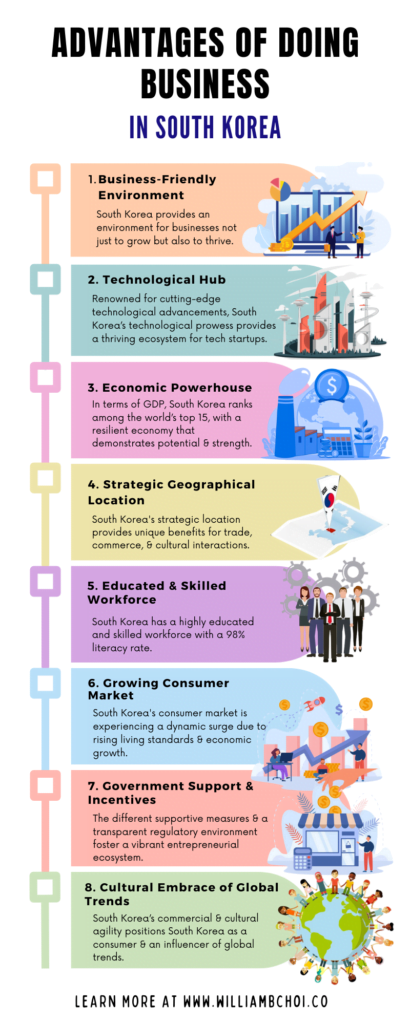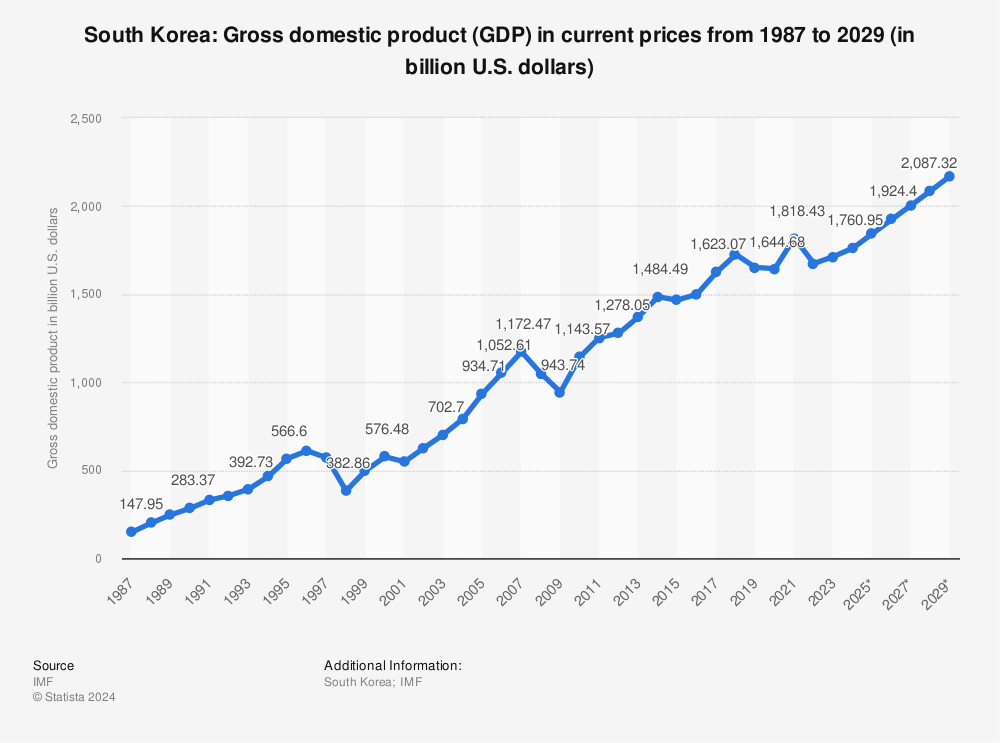The Rising Dragon: Advantages of Doing Business In South Korea
Doing business in South Korea brings with it a plethora of advantages. In this article, we will discuss the different benefits and the diverse advantages of establishing a business presence in this dynamic nation.
South Korea, the jewel of East Asia, offers impressive business opportunities. Foreign entrepreneurs from North America or Europe looking to set foot into this complex business landscape must realize that South Korea isn’t just another market. It’s a balanced blend of rich traditions and cutting-edge modernity. While the South Korean market may seem foreign, it holds unique advantages.
Navigating a new market can be challenging. William B. Choi’s expert guidance can help tech startups, SMEs, and executives with a seamless entry into the South Korean market. For tailored advice and strategies, reach out to us for a personalized consultation today.
1. Business-Friendly Environment
The South Korean government has created an environment favoring transparency and stability with a focus on business-friendly regulation.
William B. Choi.
South Korea provides an environment for businesses not just to grow but also to thrive. With transparent regulations that cater to local and foreign investments, policies that foster innovation, and a commitment to free trade, the country is a haven for businesses.
Its efficient legal system further ensures that business disputes are resolved swiftly, providing a sense of security to investors.
The stable political environment and the government’s proactive approach to offering incentives to businesses further add to South Korea’s reputation as a prime destination for investments and commercial ventures and starting new businesses.
2. Technological Hub
Renowned for cutting-edge technological advancements, South Korea boasts top global companies like LG and Samsung. Having established itself as receptive to innovation, the country’s technological prowess provides a thriving ecosystem for tech startups.

Beyond the global brands, South Korea’s vast technological landscape is also varied. The nation is consistently at the forefront of technological innovations from AI to biotechnology. Cities like Seoul, bustling with startups and innovation labs, provide opportunities for networking and collaboration.
South Korea’s robust digital infrastructure, including some of the world’s fastest internet speeds, makes an ideal backdrop for business endeavors. Moreover, the active support of the South Korean government for R&D encourages businesses to push technological boundaries constantly.
3. Economic Powerhouse
South Korea’s rise from being a war-torn country to becoming a global economic powerhouse is remarkable. One of the “Four Asian Tigers,” its economic background is a testament to its strategic planning, resilience, and relentless pursuit of growth.

In terms of GDP, South Korea ranks among the world’s top 15, with a resilient economy that demonstrates potential and strength. A thriving local market and an export giant, the nation provides opportunities for diverse business ventures.
Its swift industrialization and embrace of a knowledge-based economy have resulted in significant advancements in the automobile manufacturing, technology, and shipbuilding sectors.
South Korea’s inclusion in the G20, representing the world’s largest economies, further highlights the strength of its economy.
4. Strategic Geographical Location
South Korea’s prime geographical location offers distinctive advantages for trade, commerce, and cultural exchanges. Positioned between economic giants like China, Japan, and Russia helps facilitate seamless trade and foster strong economic ties.
The nation’s proximity to its neighbors’ markets, combined with its well-established ports like Busan (among the busiest in the world), ensures maritime trade routes.
Serving as a gateway to the broader Asian market, South Korea is an attractive hub for businesses looking to expand their global reach. The geographical advantage strengthens its economic activities while enriching its cultural and diplomatic relations.
5. Educated and Skilled Workforce
Boasting a world-class education system and a literacy rate of nearly 98%, South Korea offers a highly educated and skilled workforce, often regarded as one of its most valuable assets.
The emphasis on education, especially in STEM fields, ensures companies have access to a talent pool that’s innovative and equipped with cutting-edge skills. This dedication to education is most evident in the country’s global rankings (17th in the World Education Rankings List), with its students consistently outperforming their peers in international assessments.
Beyond academics, a significant focus on vocational training and specialized skills ensures a versatile talent pool ready for different industries. From tech giants and global conglomerates to innovative startups, all benefit from this reservoir of expertise, ranging from engineering and advanced technology to creative design and finance.
6. Growing Consumer Market
With rising living standards and economic growth, South Korea’s consumer market is experiencing a dynamic surge. The expanding middle class and their expanding purchasing power give rise to a vibrant consumer market.

Find more statistics at Statista
The appetite for quality products and services, from luxury goods and gourmet food to tech gadgets and international fashion, is on the rise. This shift in consumption patterns is mirrored by the success of local brands and the growing presence of global brands within South Korea’s shopping districts.
Moreover, while heavily influenced by global trends, the country’s younger demographic remains deeply rooted in traditional values, seeking a blend of innovation and authenticity in their purchases.
An evolving consumer landscape, coupled with South Korea’s technological infrastructure, is leading to a boom in e-commerce and digital services.
7. Robust Intellectual Property Protection
In today’s digital age, protecting intellectual property (IP) is crucial. South Korea’s robust IP protection regime shows its commitment to fostering innovation. The nation has comprehensive laws and regulations to safeguard trademarks, patents, copyrights, and trade secrets.
By aligning the IP framework with international standards, South Korea ensures that both local and foreign creators and inventors are provided with the protection they deserve.
The Korean Intellectual Property Office (KIPO) plays a vital role in administering and enforcing IP-related rights, ensuring swift processing of applications, and taking decisive action against infringements.
With active participation in global IP treaties and conventions, South Korea reinforces its commitment to upholding IP rights internationally. Such robust protection safeguards innovators’ and businesses’ inventions, creations, and brands, allowing them to confidently invest and operate in the South Korean market.
8. Government Support and Incentives
The South Korean government extensively supports foreign companies for business growth and innovation. Prioritizing economic development, the government has implemented favorable policies, especially for crucial sectors like technology, biotech, and green energy.
Benefits to foreign businesses include tax breaks and subsidy reductions for reducing operational costs. Free Economic Zones (FEZs) and Special Economic Zones (SEZs) offer businesses advanced infrastructure, streamlined regulations, and fiscal benefits.
Additionally, the government continually invests in R&D, often collaborating with the private sector to co-fund projects. Low-interest loan programs and numerous grants are available to startups and SMEs to help promote their growth trajectories.
The different supportive measures, together with a transparent regulatory environment, foster a vibrant entrepreneurial ecosystem. Businesses looking to innovate, expand, and thrive will find South Korea a compelling destination.
9. Cultural Embrace of Global Trends
Among the most notable characteristics of modern South Korean society is its unique ability to embrace and integrate global trends while maintaining its distinct cultural identity.
South Korea’s Hallyu wave, comprising K-pop, K-dramas, and cinema, reflects its cultural embrace of global trends and its influence in shaping them. Following this trend is the country’s fashion and beauty industries, often promoting innovative products and styles that gain worldwide acclaim.
Moreover, South Korea’s technological sector, influenced by international advancements, is quick to adapt and innovate, catering to local and global markets.
Such commercial and cultural agility positions South Korea as a consumer and an influencer of global trends. Businesses operating here benefit from a market receptive to new ideas, experiences, and products.
10. Challenges and Overcoming Them
No market is without challenges. Despite presenting a myriad of opportunities for businesses, South Korea also brings its share of challenges.
One of the biggest challenges foreign entrepreneurs will face is understanding the South Korean business culture. It’s critical to follow local norms and customs so as not to offend potential partners.
William B. Choi
The competitive landscape, dominated by ‘chaebols’ or large conglomerates, can overwhelm SMEs trying to carve a niche. And while the web of regulations is designed for transparency, it can sometimes cause bureaucratic hurdles for newcomers unfamiliar with the system.
Additionally, cultural nuances, especially in communication and business etiquette, necessitate a subtle understanding to build lasting relationships.
These challenges can be effectively navigated with informed strategies, proactive planning, and the guidance of experts like William B. Choi. Embracing cultural immersion, understanding business etiquette, and partnering with local experts or consultants can promote sustained success.
The South Korean government, recognizing these challenges, offers support through advisory services, incubation programs, and training workshops.
Final Thoughts on Advancing Your Business in South Korea
Entering the South Korean market isn’t just a business decision; it’s a leap into immense possibilities, innovation, and culture. With its economic strength, blend of modernity and tradition, and technological prowess, the country emerges as a land of unparalleled potential.
Get started on an exciting venture with the insights and expertise of William B. Choi for guaranteed success.






